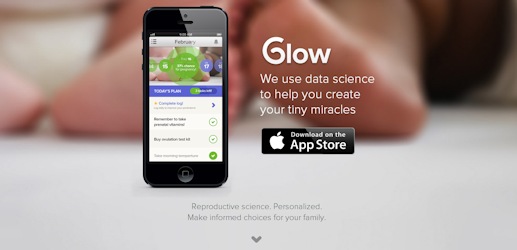In an effort to help couples facing infertility problems achieve pregnancy, the co-founder of PayPal has developed an iPhone app to monitor fertility and track baby-making data. Max Levchin realized the need for more natural remedies to fertility issues when he and his wife struggled to conceive. His new iPhone app, Glow, just hit the Apple store, and it combines data and science to (if possible) help couples kick infertility through natural means, such as learning cervical mucus patterns and tracking a woman’s cycle to obtain the best information about when her fertile days occur. If that doesn’t work, the data analysis side of the app can direct couples to the most appropriate alternative solutions or medical intervention.
Levchin’s app seems to be a step in the right direction, for several reasons. First of all, many couples who have used Natural Family Planning (NFP) have done so to achieve pregnancy, and been successful. However, today’s NFP is often confused with the unsuccessful and scientifically unsound methods of pregnancy prevention of yesteryear, like the rhythm method. This couldn’t be farther from the truth. Couples who use scientifically based natural means of pregnancy prevention and achievement have high success rates in accomplishing their objectives.
Levchin’s app may help to solidify the fact that NFP is a legitimate and excellent alternative to many unnecessary hormonal and surgical interventions used for both pregnancy prevention and achievement. “He wants to radically change the way American doctors and patients talk about infertility,” a recent article from Quartz on the subject said. And in the face of alternative treatments and ethical problems associated with mainstream infertility treatment, this radical change may be just what the doctor ordered.
Levchin and Huang [his co-founder] hope the free app, which has the same kinds of game-like features and simple design that make fitness junkies so app-happy, will make natural conception both easier and more fun. It gives its users daily prompts to enter data on everything from temperature to the sexual positions they’ve used. And it comes in his-and-hers versions, a choice intended to keep women from feeling that they’re alone in their efforts to conceive.
Another reason why Levchin’s focus on natural baby-making could be great for the world at large is that conventional infertility treatments at a doctor’s office are riddled with moral conundrums, including the discarding of innumerable human beings who are created as a commodity to be used or discarded according to their supposed utility. In vitro fertilization (IVF), for example, is a treatment which regularly employs the creation of multiple embryos in a petri dish who are never intended for implantation in the safety of their mother’s womb. Instead, a doctor extracts many eggs from a woman’s ovaries, fertilizes them with her partner’s (or some other male’s) sperm, and then sorts through them with a microscope to determine which of the humans in his dish have the best chance of survival upon implantation. There could be one or maybe even five or six embryos who are deemed viable “enough” to have a shot at continuing life. These are implanted, while their siblings are simply thrown away.
The second ethical dilemma arises after these unwanted embryos are discarded: the ones who were given a shot to continue life may be more successful than the infertile woman had hoped. She may find herself pregnant with twins, triplets, or more. Some women (think Kate Gosselin and OctoMom) have successfully carried six or eight healthy babies to term, but not all women are open to a future of chasing after multiples. To achieve their goal of having one or two healthy babies, a procedure called “selective reduction” may be employed, in which all of the viable embryos except for the one(s) the mother wants to keep are aborted. This may be done by injecting their beating hearts with a solution which stops them in utero. The woman carries her remaining child(ren) to term, and when she gives birth, she also delivers her other long-dead babies in the process.
These practices have become commonplace in infertility medicine. Levchin’s app is an opportunity to change the tide of unethical baby-related decisions.








